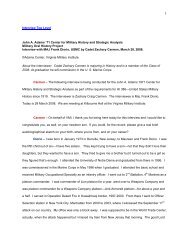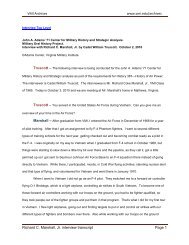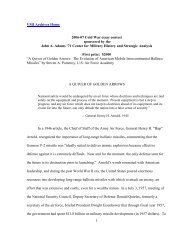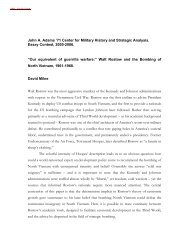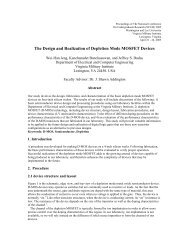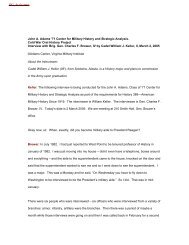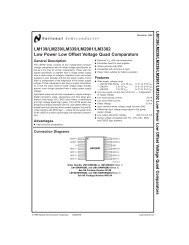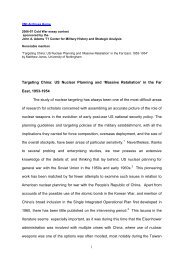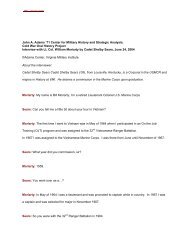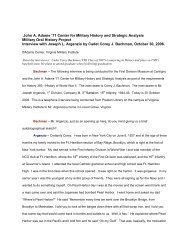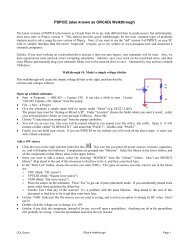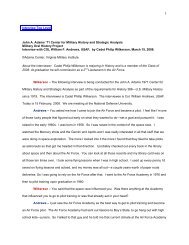Academic Catalog - Virginia Military Institute Admissions
Academic Catalog - Virginia Military Institute Admissions
Academic Catalog - Virginia Military Institute Admissions
You also want an ePaper? Increase the reach of your titles
YUMPU automatically turns print PDFs into web optimized ePapers that Google loves.
<strong>Virginia</strong> <strong>Military</strong> <strong>Institute</strong><br />
12-13 <strong>Catalog</strong>ue<br />
HI 316. Food and Hunger in History 3—0—3<br />
This course explores themes and issues relating to social and cultural dimensions of food<br />
and food shortages in past times. The course ranges widely across time and space and<br />
adopts an explicitly comparative approach. Topics examined include the transition from<br />
hunting and gathering to agriculture, the historical development of food production and<br />
distribution systems, the emergence of staple crops as commodities, and the causes and<br />
consequences of food shortages. The course is open to students of all majors who have<br />
passed both semesters of World History (HI 103 and HI 104). The course may be offered<br />
as a “Civilizations and Cultures” course (HI 316X)<br />
HI 319. THE AFRICAN AMERICAN EXPERIENCE 3—0—3<br />
A general introduction to the African American experience in the United States beginning<br />
in Africa in the 15th century and continuing through to the late 20th century. Region: United<br />
States. Methodologically intensive.<br />
HI 321. THE OLD SOUTH 3—0—3<br />
The social, intellectual, economic, and political history of the American South before the<br />
Civil War. Major topics include the plantation system, slavery, and the evolution of southern<br />
sectionalism. Region: United States.<br />
HI 322. THE CIVIL WAR AND RECONSTRUCTION 3—0—3<br />
The causes and course of the American Civil War and the issues and consequences of<br />
Reconstruction. Region: United States.<br />
HI 323 HISTORY OF THE SOUTH FROM 1865 3—0—3<br />
Political, social, economic, cultural, and demographic history of the Southern United States<br />
from 1865 to the present, with emphasis on interpretations of Southern history by twentiethcentury<br />
historians. Topics include Reconstruction, segregation and disfranchisement, the “New<br />
South Creed” and industrialization, the Civil Rights Movement, and Southern popular culture.<br />
Prerequisite: HI 206 or permission of instructor. Region: United States. Methodologically intensive.<br />
HI 324. AMERICAN FOREIGN RELATIONS TO 1919 3—0—3<br />
An upper level survey of American foreign relations from the founding of the nation through<br />
World War I. Emphasis will be placed on the securing of American independence, continental<br />
expansion of the mid 19th century and the global expansion of American interests in the<br />
late 19th and early 20th centuries. Considers the interplay of diplomacy, security issues,<br />
economics and culture in American relations with the world. Region: United States.<br />
HI 325. AMERICAN FOREIGN RELATIONS SINCE 1919 3—0—3<br />
An upper level survey of American foreign relations from the end of World War I until recent<br />
times. Important topics include America’s emergence as a leading economic power, the<br />
background to World War II, the rise and the demise of the Cold War and American attempts<br />
to cope with the post-Cold War world. Prior completion of HI 324, “American Foreign Relations<br />
to 1919” is recommended, but not required. Region: United States.<br />
HI 327. INDIA FROM THE AGE OF THE HARRAPANS TO THE PRESENT DAY 3—0—3<br />
An upper-level survey of the history of India from the earliest age of complex society on<br />
the subcontinent to the present day. Topics include the development of India’s religions, the<br />
caste system, art, philosophy, and politics as well as India’s role in European imperialism. In<br />
addition, the class will examine the development of India post-1945 to illustrate the rising<br />
importance of the country on the modern international stage. Region: Africa/Asia/Latin America.<br />
HI 328. BRITISH IMPERIALISM 3—0—3<br />
An upper-level survey that will examine the growth of the British empire beginning in<br />
16th century England and examine the importance of the institution to British development<br />
and the impact that it had on world history. Topics include the ideology underpinning the<br />
institution and changes to imperial ideology over time, the political growth of the empire<br />
and its role in British diplomacy, the economic impact of it on British life, and the effect of<br />
it on indigenous populations. Finally, the course examines the legacy of British imperialism<br />
in the modern world. Region: Europe or Africa/Asia/Latin America.<br />
HI 330. TOPICS IN ANCIENT HISTORY 3—0—3<br />
A problems course covering selected topics in the ancient world, historical controversies,<br />
and major turning points. The course presumes a general knowledge of the ancient world<br />
from the first semester of Western or World Civilization. The three civilizations discussed<br />
will be the Ancient Near East, Greece, and Rome. Region: Europe or Africa/Asia/Latin America,<br />
but not both. Methodologically intensive.<br />
HI 331. COLONIAL AMERICA 3—0—3<br />
A study of eastern North America from contact through the American revolution. The<br />
early colonial section examines major social, political, religious, and economic trends,<br />
plus evolving relationships with Indians. The revolutionary section examines the complex<br />
forces which produced the American rebellion and concludes with a campaign history of<br />
the Revolutionary War. Region: United States. Methodologically intensive.<br />
HI 332. NORTH AMERICAN INDIANS 3—0—3<br />
A survey of North American Indian history from late pre-contact through the twentieth<br />
century. Requires a major research paper on one tribe north of Mexico. Region: United States.<br />
Usually offered as Writing Intensive.<br />
HI 333. HISTORY OF THE MIDDLE EAST I 3—0—3<br />
Surveys the history of the Middle East and North Africa from the rise of Islam in the 7th<br />
century in Arabia to the beginning of the modern era in the 1800s. Focuses on Islam as both<br />
a religion and a civilization and includes the study of the Islamic faith and its institutions, the<br />
political history of the region and aspects of the culture, particularly art and architecture.<br />
Region: Africa/Asia/Latin America.<br />
HI 334. HISTORY OF THE MIDDLE EAST II 3—0—3<br />
Continues the History of the Middle East in the modern period. The course begins in the<br />
eighteenth century with the waning of the power of the Ottoman Empire and follows the region<br />
through a period of historic change and transformation to the present. Students will focus<br />
on the following issues, among others: the socio-economic transformation of the region in<br />
the 19th century, European imperialism and colonialism, the evolution of the modern state<br />
system, the conflict over Palestine and the rise of political Islam. Region: Africa/Asia/Latin America.<br />
HI 335. THE VIETNAM WAR 3—0—3<br />
Traces the military, political, and diplomatic history of Vietnam from the earliest times to<br />
the present. The course emphasizes the period after the second World War: the Indo-China<br />
War, and especially, the Vietnam War. Region: Africa/Asia/Latin America.<br />
HI 336. ISLAM IN NORTH AMERICA AND WESTERN EUROPE 3—0—3<br />
Islam is believed to be growing faster than any religion in the United States today, and<br />
is the second largest religion in Europe. This methodologically intensive course examines<br />
the past and contemporary history of Muslims in the West, including the emergence and<br />
development of Muslim communities and institutions, Islamic devotional life and education,<br />
the impact of Muslims’ immigration from the Middle East and Africa, and the process of their<br />
integration into Western societies. Looking beyond mutually hostile stereotyping between<br />
Islam and the West is one of the objectives of the class. Region: United States or Europe, but<br />
not both. Methodologically intensive.<br />
HI 346. MODERN JAPAN 3—0—3<br />
An examination of the rise of modern Japan from the mid-19th century to the present.<br />
Topics that will be covered are: the opening of Japan and the Meiji Restoration, economic<br />
modernization, nationalism and expansionism, political development, militarism and the<br />
Pacific War, American occupation, postwar Japan and the economic miracle. Region: Africa/<br />
Asia/Latin America.<br />
HI 348. AFRICA IN MODERN TIMES, 1700 to PRESENT 3—0—3<br />
Survey of the historical experiences that have shaped contemporary sub-Saharan Africa:<br />
the slave trade, European partition and imperial rule, and independence and nationhood.<br />
Region: Africa/Asia/Latin America.<br />
HI 350. FRENCH REVOLUTION AND NAPOLEON 3—0—3<br />
A study of the collapse of the Ancient Regime and the causes of the French Revolution,<br />
the stages of the Revolution, and Napoleon as a domestic reformer and exporter of the<br />
Revolution. The course will emphasize the European context of the age of democratic<br />
revolution, 1789-1815. No prerequisite. Region: Europe. Methodologically intensive.<br />
HI 355. GRAND STRATEGY IN THE TWENTIETH CENTURY 3—0—3<br />
Examines the coordination of military strategy, mobilization, diplomacy, and other national<br />
or coalition instruments to achieve political goals in war during the twentieth century.<br />
HI 356. TWENTIETH-CENTURY CHINA 3—0—3<br />
A study of China’s twentieth-century revolutions since the overthrow of the last emperor<br />
in 1911. Examines the tortured efforts of the Nationalists and Communists to recreate<br />
the country and the culture, even while foreign “barbarians” were pounding on the gates.<br />
Studies a century of civil war, social reform movements, and political purges, concluding<br />
with Deng Xiaoping’s recent efforts to build a modern China where “to get rich is glorious.”<br />
Region: Africa/Asia/Latin America.<br />
HI 357. LATE IMPERIAL CHINA 3—0—3<br />
Major events and trends in Chinese history during the last two great dynasties, the Ming<br />
(1368-1644) and the Qing (1644-1911), including historians’ evolving interpretations of the<br />
periods. Topics include the role of the emperor, the world of the peasantry, the dynastic<br />
cycle, The Opium War, the problem of imperialism, the great Taiping Rebellion, The Boxer<br />
Uprising, and the 1911 Revolution. Prerequisite: HI 104. Region: Africa/Asia/Latin America.<br />
Methodologically intensive.<br />
HI 361. THE AGE OF BLOOD AND IRON. EUROPE, 1871-1918 3—0—3<br />
Survey of Europe in the period. This course begins with a discussion of the 1870-1871<br />
Franco-Prussian War. It then successively examines social and economic developments,<br />
political developments in the separate European states, imperialism, the division of Europe<br />
into two hostile alliance systems, the arms race, the fundamental and immediate causes of<br />
the First World War, and the war itself. Region: Europe.<br />
HI 365. FRANCE AND THE FRENCH EMPIRE 1815 TO THE PRESENT 3—0—3<br />
Surveys the political and socioeconomic history of France and its overseas empire from<br />
Waterloo to the present. Significant focus on developments in Africa and Indochina. No<br />
prerequisite, but HI 350 is recommended. Region: Europe.<br />
HI 368. A BROKEN WORLD: EUROPE, 1919-1945 3—0—3<br />
Survey of Europe in the period. It begins with the peace settlement following the first World<br />
War. Through a chronological approach by country, it treats political, diplomatic, and military<br />
trends and events of the period, including the rise of fascism and totalitarianism, and the<br />
roles played by individual leaders as Mussolini, Hitler, Stalin, and Churchill. It then deals with<br />
events leading to the Second World War, and the war itself. Region: Europe.<br />
HI 372. READING COURSE FOR HONORS 3—0—3<br />
Reading in depth in a selected field of history under the supervision of a faculty sponsor<br />
as preparation for an honors research paper. Preparation of an annotated bibliography<br />
and introduction to historical methodology. Prerequisite: Admission to the History Honors<br />
Program. Methodologically intensive.<br />
94





